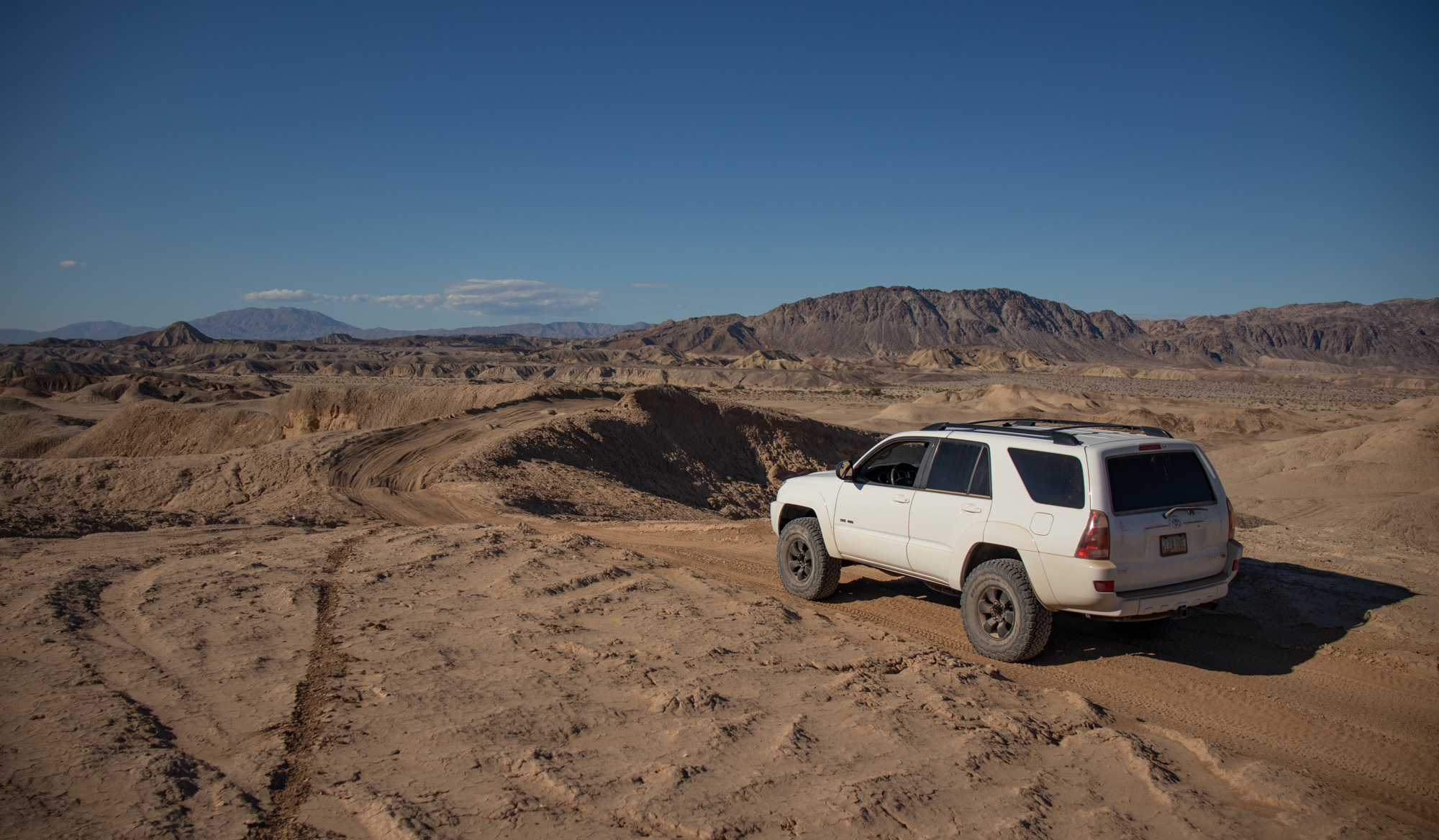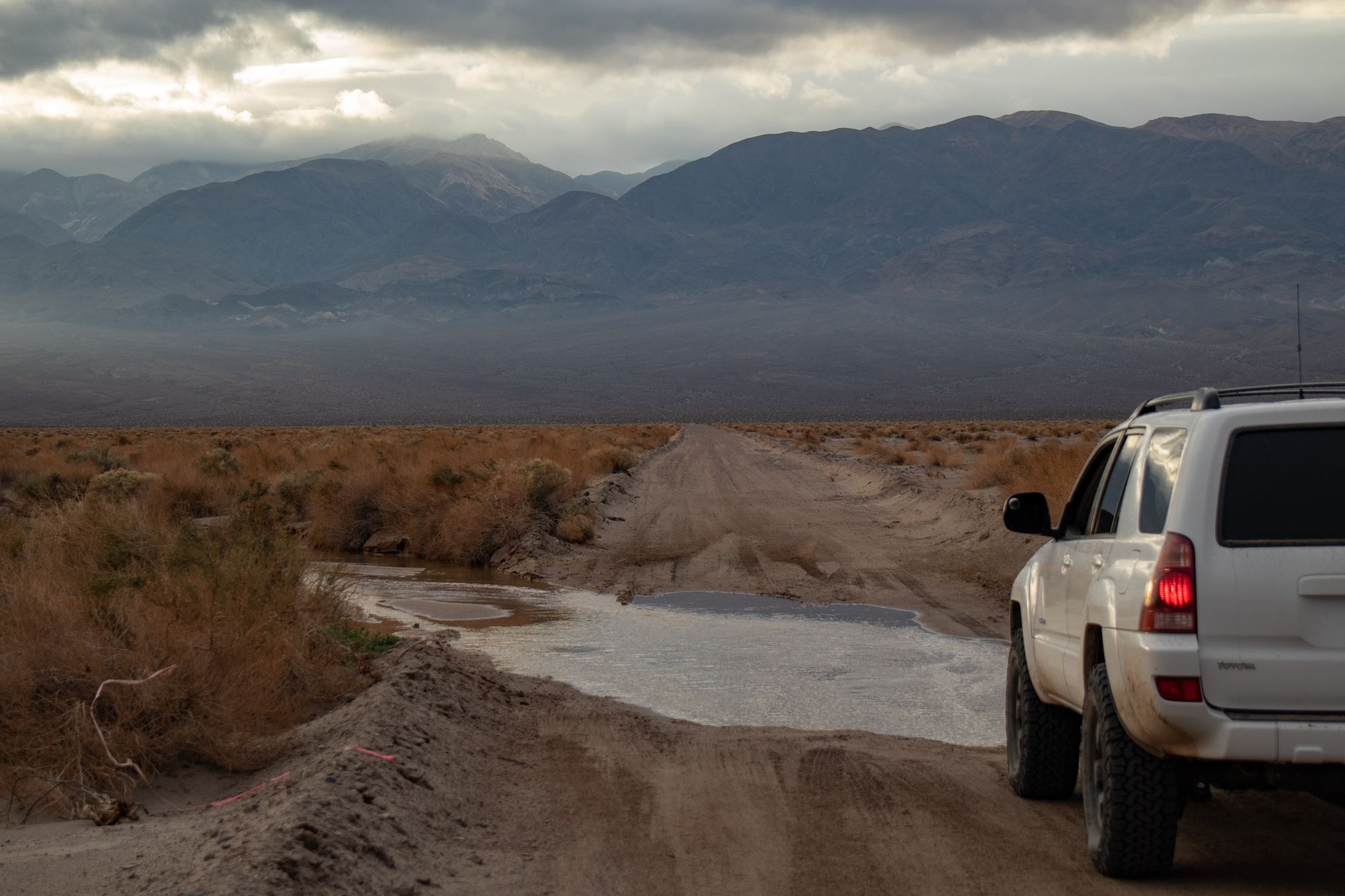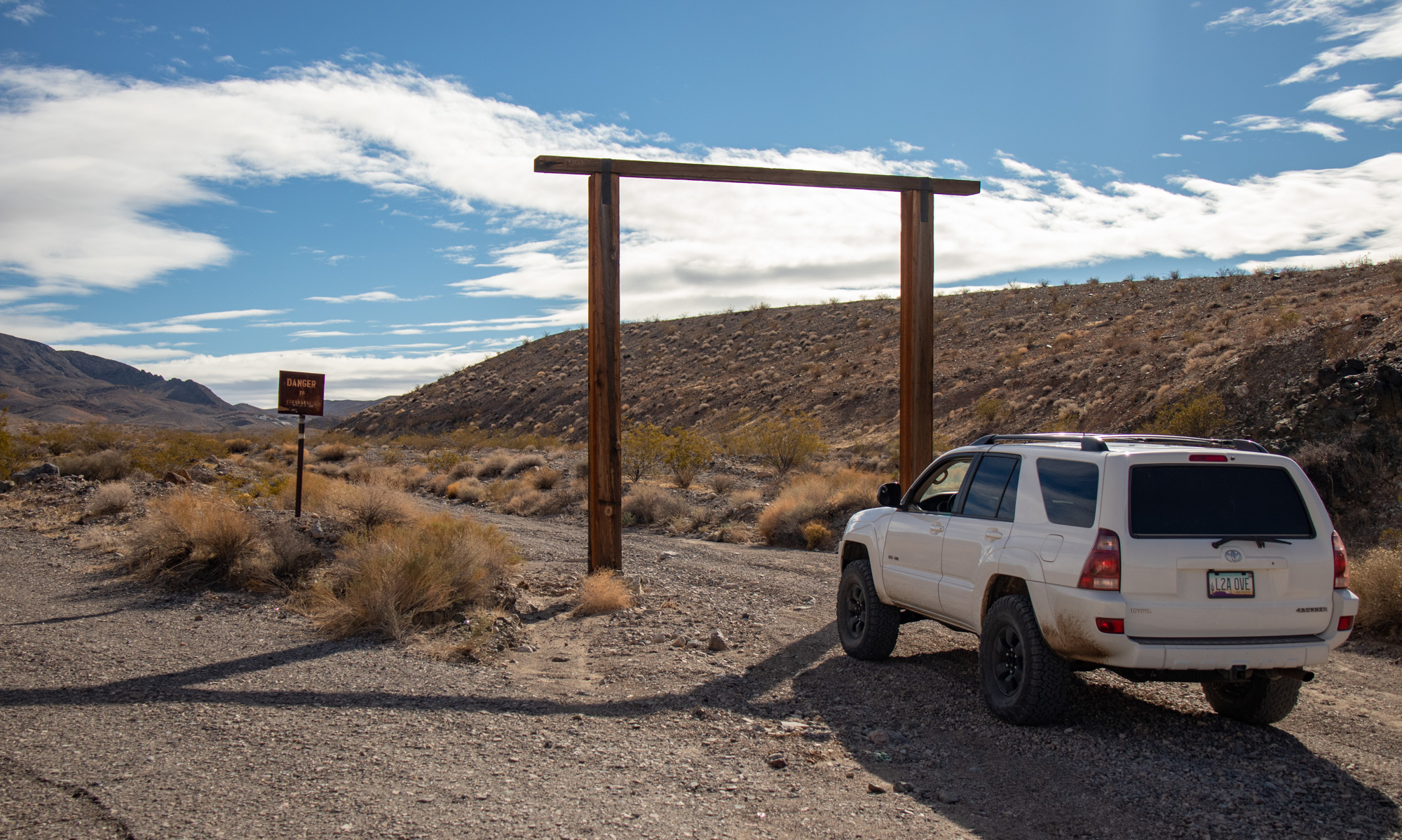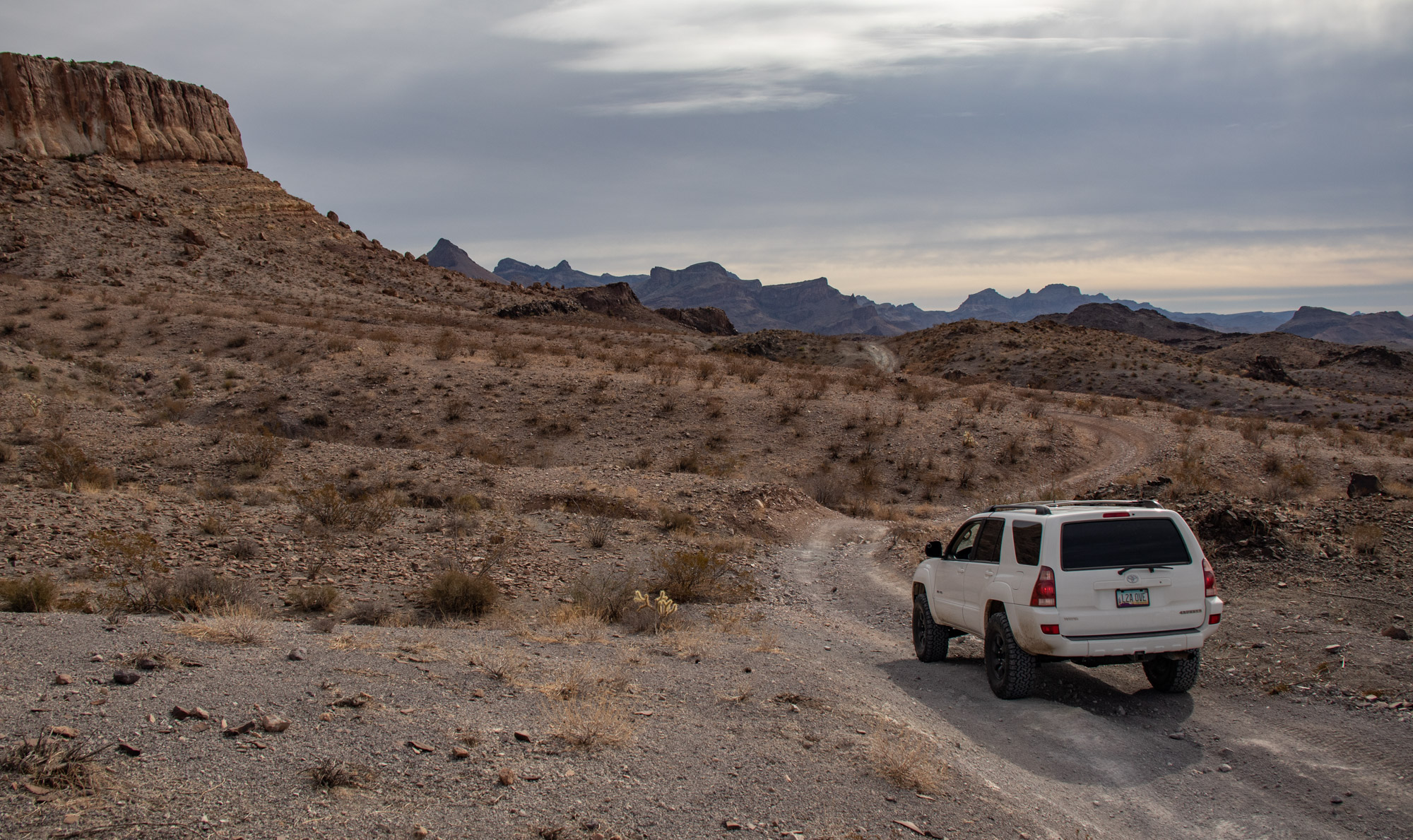I can’t believe it’s been over two years since the last trip report. A lot has happened in that time – moving, career change and all the various life obstacles. The biggest one for the adventure/vehicle side of things was selling the Tacoma, out of a need of necessity and a different focus going forward. Unfortunately that left us without a nicely setup and nearly dedicated exploring rig and the new truck wasn’t bought as it’s “replacement”.
I knew that with the big ol’ Ford F-350 many of the trails and places would no longer be easily accessible, but it didn’t mean it was all now off-limits. Just have to go about things a bit different. With that in mind, found a decent deal on a camper shell and decided to go back to the roots. Simpler times. No RTT, no radical suspension setup, no drawer system or refrigerator. Shell, sleeping bag, ice chest, tools & basic supplies. Make Camping Simple Again.
With the basics in place and a area I had planned to explore with the Tacoma but never got the chance to, I set off to the El Paso Mountain range in the SuperDuty.
The El Paso Mountain Range Straight Ahead
Quick stop by Friends of Jawbone to give it a look as well as grab a couple maps of the local areas.
From there continued up Highway 14 until I reached RedRock Randsburg Rd which I then followed to Mesquite Canyon Trail. There’s a few other options that you can take into the El Paso’s on this side of the mountain, all different in approach, scenery and difficulty. For me I choice the easy route as a break-in run with the giant diesel.
The 65 PSI was of no use once the tires touched dirt. Aired down to 30 front and 25 rear and the truck actually rode great.
As I said, Mesquite Canyon is easy and a quick way to get into the area. Basic dirt trail with a few mines to see along the way.
First place I wanted to check out was Walsh Cabin high up on the southern slope. EP204 looked to be the best way from all my research. Put the truck into 4-low and started climbing, not sure what to expect and hoping I could make it or turn around.
Mesquite Canyon (EP100) follows the base of the mountain towards Fremont Valley towards the right.
You can see the Old Dutch Cleanser Mine, Last Chance Canyon and Bickel’s Camp far off in the distance.
After finally reaching a spot that was as good as any, my stomach dropped a bit when I fully realized how much more there was to this climb. Don’t get me wrong, had I been in the Tacoma or any of my previous vehicles I would do this in reverse, one tire fire, blindfolded and steer with my knee. Wouldn’t have been a second thought going into it. But being by myself, testing out the trucks capabilities for the first time in a new area did made me second question myself. Decided to take a breather and scope it out on foot just to be sure what I would be getting myself into if I decided to go for it. The remaining climb didn’t have any obstacles that would make it a challenge other than going up and keeping momentum. With that in mind, reassuring myself of my knowledge and experiences off-roading and doing a quick reality check I continued on.
Looking down on EP15 – The “main” route through the area.
Once at top of the remaining big climb I got out to check out the surroundings. Views for days!
Looking back on the EP204.
Burro Schmidt’s Cabin off in the distance. The tunnel is right behind the small hill on the right.

Looking South-West. Koehn Dry Lake Bed in Fremont Valley.
At this point you can also see the Walsh Cabin.


Easy drive the rest of the way to the cabin.

I wasn’t able to dig up any information on the Walsh cabin, either online or when I visited the Friends of Jawbone/Ranger station. Looking around the area and on maps doesn’t look like much happened here in the form of mining other than a claim name of “Copperola Prospect” that supposedly shipped 30 tons of ore to a smelter in 1949.. There is a vertical shaft nearby, but you can see the bottom. Maybe filed a claim in order to build a cabin with a view? Nonetheless, it was extremely windy at this point. All the supporting cables make sense after being blown around while wandering.
Bummer it’s in it’s current condition as this would make one hell of a place to stay.











After my fill of gusty wind it was time to get a move on. Backtrack down to Mesquite Canyon then connect with EP15 and head east. First, a quick stop to check out the small mine site next to the cabin.





On EP15, first stop would be the Colorado Camp. Once used by gold miners seeking rest for the night after being out looking for their fortunes in the nearby hills of the surrounding desert, now nothing remains except a small foundation and a chimney stack.




Continued east on EP15, passing by a few mines along the way. The most notable being the Apache Mine which consisted of six copper claims and was established in the Goler Mining District in 1893, was also reopened for a short time during the 1920s.



The Apache Mine




“The Holland Camp was first owned by Burro Schmidt, as part of his Copper Basin Group claim. But once he was engrossed by his tunnel project, Schmidt no longer tended to this claim and sold it to the trio of William Smith, Neil Brown, and John Hamblen. They began to develop Holland Camp in the late 1930s, but the site quickly died out in 1940.” A mill at the camp in 1940 recovered a few ounces of gold and less than 100 pounds of copper.





Wanted to check out a couple old cars that are in the area before heading back on the EP15 towards Burro Schmidt’s & Bickel Camp.










The headframe from the Zuna Claim that I spotted while going to Walsh Cabin.

Burro Schmidt’s

“William Henry Burro Schmidt was frail and small of stature, yet he prospected around Kern County and established claims in the El Paso Mountains. In 1906 he began to dig, drill, and blast his way through the interior of the mountain. After 32 years, in 1938, a daylight was finally visible through the far side of the tunnel. Unfortunately he revealed no gold.”
There’s a great article on “Burro Schmidt” and his life’s work at by Scott Schwartz and DesertUSA.




Around the cabin and up over the back side of the small hill reveals the tunnel. I’ll admit I chickened out going through, just something about the current mood of the desert brought on a Hills Have Eyes vibe.






View looking back from the tunnel.
Feeling like it was about that time to head to camp and relax for a bit, began the short journey back down the mountain and passed by Bickel Camp.



Bickel Camp was closed, most likely because it was a weekday and getting later in the day. I continued to a camp spot up the way on EP30.
Nice thing about no service and being solo, you can take the time to actually relax. Sound of the wind, rad scenery, no distractions, bit of reading/research and a few cold beers was exactly what I needed. Felt good to be in my element.

As the sunset, the wind finally died down, finally. “Cooked” a dinner, started a camp fire and relaxed under the starts for a couple hours until the FMA (fast moving air) returned.
In the morning quickly packed up and started the day. Drove towards Last Chance Canyon using EP15. I knew I’d only be able to go so far, due to time and trying to keep myself from being in a bad position. The further you go, the more obstacles you encounter including a decent slope called “Graduation Hill” and the wash/trail gets more rocky. Not something I was ready to tackle by myself or first trip in the truck.
Mmmm Ice Cream…
The trail gets sandy as it takes you by various small prospects, however they’re overshadowed by the giant Old Dutch Cleanse Mine.
The Old Dutch Cleanse Mine is along the top ridge
Dropping back into the wash is where I decided to turn around and make the drive back to the intersection of EP15/Last Chance Canyon and EP30.
Heading back up Last Chance Canyon
At the EP15 & EP30 intersection there’s a piece of a trammel to help point travelers where Schmidt’s tunnel is.
On a spur road close by a couple cabins, stone structure and well remain from the Broken Spade & Boulder claims.
From here jumped back on the EP15 to do a portion of the Bonanza Trail. On the other side of the hill is the Holly Ash / Calsilco Mine, a large pumice deposit.
“During the late 1800’s and early 1900’s miners discovered the pumice which was used for cleaning material. There was fierce competition between multiple mines in regards to the pumice that was found here.”
“The Calsilco deposit was first worked by a unidentified concern from 1919 to 1945, then briefly by the Insulpum Corporation, and since 1946 by the Calsilco Corporation. Total production is greater than 25,000 tons of raw material. The raw material was being mined intermittently in 1958, milled and bagged on the property, and hauled by truck to Los Angeles or rail siding. The finished products have been used in insulation and acoustical plaster, cleaning compounds, wood and paint fillers, toothpaste, soil conditioners, and oil-absorbing compounds.”
Onto the Bonanza Trail




The Post Office in the distance
Dropping down into the Bonanza Gulch is quick and easy.


The Sears Cabin down in the Bonanza Gulch
First stop – Post Office.
“Originally a post office built in the 1930’s to serve the community around and in Bonanza Gulch, the Post Office suffered from vandalism in the early 2000’s. After being nearly destroyed, the BLM and historic cabin volunteers rebuilt and restored the cabin in 2006.”
Onward to the Sears Cabin.
Looking further down the gulch the Jon-Jac Cabin becomes visible.
Short drive down the trail and I stop at the Jon-Jac cabin. Was there only a couple minutes before 2 vehicles rolled in and parked. 2 gentleman got out, introduced themselves and gave me a bit of history while exploring. Members of the Hi-N-Lo Off-Road group, they had previously done quite a bit of work to this cabin in the early 2000’s.
One more cabin lays within the gulch, but not in the same condition as the previous three. Failed to find any information on the cabin or nearby claims.
Finally onto Bickel’s Camp. I was glad to see the gates open and a caretaker on site as that’s the only time visitors are welcome on the property.
“This depression era mining camp was founded by Walt Bickel in 1934. Walk mined placer gold in the area using unique tools and methods he experimented with and perfected. He kept busy studying astronomy, edible plants, geology and the archaeology of this fascinating area in the El Paso Mountains”.
There’s a dedicated website to the Bickel Camp – https://www.bickelcamp.org
You could potentially spend hours here depending on how much you want to see. But for me it was time to make the trip home even though I had originally planned to camp again somewhere in the area. The harsh wind and covering all the main areas I wanted to see this trip made the decision a easy one. There was one last stop along the way, and that’s the Old Dutch Cleanse Mine.
Rad little overlook on the way to the Old Dutch offers a nice vantage point of Last Chance Canyon. On the top of the mountain in the distance you can see a small bit of trail, EP204, the way up to Walsh Cabin.
“Pumicite production from the property began in 1923 under the auspices of the Cudahy Packing Company. Material was removed from underground workings along wide drifts on a vein height up to 21 feet from floor to ceiling. The large side-by-side portals of these workings on the face of the white outcrop are still completely intact.
During the early mining period hand labor was used to remove slabs of the semi-hard, brittle material for placement in 1-1/2-ton side-dumping cars pulled up out of the mine into daylight by burros. Twelve men were employed to produce 100 tons of pumicite per week. While remote western ores were hauled to shipping centers by burro or mule-team, the ore from The Old Dutch Cleanser mine was lowered to loading bins over a 475-foot- long inclined rail tramway. Evidence of this unusual conveyance is easily observed today, most safely from the lower roads.
From the base of the rail tramway the mined rock was trucked to a siding on the Southern Pacific Railroad seven miles due south of the mine. The tramway on the western workings was shut down when a road was built to the eastern workings on the same vein. Truck loading was then employed near the working portals. Rail cars delivered the ore to Los Angeles, where it was ground and blended with other material to produce a disinfecting scouring powder.
The product was and is widely known throughout the U.S. as Old Dutch Cleanser, a domestic kitchen and bathroom scouring agent. Beginning in 1947 the manufacturers obtained their pumicite from other sources.” [Mine-Engineer]
Just the view of Last Chance Canyon is worth the detour.
It was off to find pavement and begin the journey home. Followed markers for Sierra View Road towards Jawbone Station until it met Highway 14.
Felt great to be back exploring and definitely can’t wait to go again. This trip was the perfect kick in the ass to continue the adventure.
Until next time!






























































































































Great read and awesome photos!! Happy to see you back out there!!
Thanks! Looking forward to our upcoming trip.
Hey great pics and looks like an amazing adventure. I’m a photographer. I’d love to photograph Holly Ash Mine. I drive a 2016 Subaru Crosstrek still stock. How was the road to the mine?
KYLE I ENJOYED YOUR TRIP TO THE APACHE MINES. HOWEVER I LIVED AT THE HOLLAND CAMP FROM 1940 T0 1945 MY DAD MACK WILLIAMSON AND UNCLE BILL WILLIAMS ALONG WITH OTHER MEN DUG IN THE APACHE MINES TILL WE LEFT IN 1945. THEY ONLY GOT OUT A COUPLE OUNCES OF GOLD. WE DELT WITH BURTON BROS. I JUST GOT BACK FROM A TRIP SEEING THE MINES AND CAMP LAST SUNDAY. MR JD VOSS FROM GARLOCK TAUGHT MY DAD ALOT ABOUT MINING . I HAVE A BOOK ON MINING HE SIGNED AND GAVE MY DAD. I HAVE A TOYOTA TACOMA 2000 WHICH GETS ME AROUND THE DESSERT. GREAT TRUCK. SO NICE YOU PUT OUT THIS VIDEO. I WILL ENYOY IT MANY TIMES. THANKS SHIRLEY WILLIAMSON.